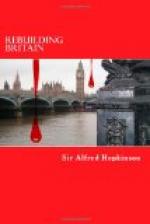of cases of repudiation of such agreements is almost
negligible. To plead the Statute of Frauds in
an action for non-delivery or non-acceptance of goods
under such informal agreements might be a defence
in the law courts, but would not save the defendant
from the indeterminate but effective penalties due
to the feeling of his fellows that he was acting dishonourably.
It is instructive to notice that in dealing with the
question of industrial disputes, which are in many
ways analogous to international, at least where they
arise between organised bodies of employers and of
workpeople, the Whitley Committee, in a supplemental
report issued in January, 1918, expressed the opinion:
(1) that no attempt should be made to establish compulsory
arbitration or compulsory legislation to prevent strikes
and lock-outs; (2) that there should be standing arbitration
councils or panels of arbitrators to whom disputes
arising could be voluntarily referred; (3) that provision
should be made for independent inquiry and report as
to the merits of trade disputes; (4) that legal penalties
for breach of an award or of an agreement made to
settle a trade dispute should not be imposed; (5) that
the decisions of industrial tribunals and arbitrators
should be co-ordinated as far as possible, and that
there should be opportunity for interchange of opinion
between the arbitrators whose awards should be circulated.
A body of customary law on the subject would thus grow
up without legal sanction, but of great value in promoting
uniformity and preventing the ill-feeling which would
arise from conflicting decisions in different cases
involving similar questions. Those who have taken
any part in deciding questions affecting wages or
trade conditions have found the need of some standard
to appeal to, and felt the danger likely to arise
from giving decisions either less or more favourable
to either party than had been given in other districts
in similar circumstances. In an analogous way,
decisions of the prize court of one country are quoted
in the courts of other countries, although they are
not binding on them. International Law did exist,
and had an important practical influence. Diplomatists
did appeal to it, and the prize tribunals, in administering
the law, stated distinctly that they would be guided
by and would apply the principles of that law, even
if the orders issued by the administrative Government
of their own country were at variance with it.
The decision of the Privy Council in the case of the
Zamora establishes the principle that the law
which prize courts will follow is International Law,
and that they will do so though some Order in Council
may conflict with it.
FOOTNOTES:
[Footnote 4: How strong this belief was among many of those who had often been in opposition to the British Government was shown at a meeting in Bombay early in the War. The enthusiastic speech of the chairman, the late Sir Pherozeshah Mehta, one of the ablest and most persistent critics of British rule in India for very many years, is one to be remembered.]




